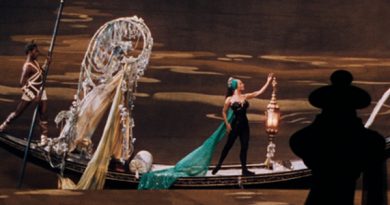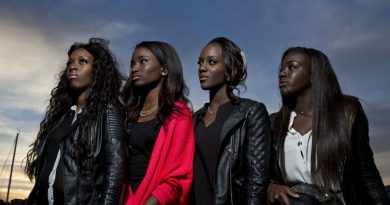Going Bongo (12) | Home Ents Review
Dir. Dean Matthew Ronalds, Tanzania/US, 2015, 90 mins
Cast: Ernest Napoleon, Emanuela Galliussi, Ashley Olds, Gabriel Jarret, Ahmed Olutu, Nyokabi Gethaiga, McDonald Haule, Sauda Simba Kilumanga and Evans Bukuku.
What is so interesting about this film is that it is the first major production that we have seen that comes from Tanzania, which, of course, is a British Commonwealth country.
Going Bongo is a collaborative project between Tanzanian and American film makers and is likely to be one of the biggest films so far to come out of Tanzania, and probably the whole of East Africa. A large part of the film is shot in Dar es Salaam, a major city of Tanzania, and the remaining part shot in Los Angeles, California.
The lead role is played by a Tanzanian actor, Ernest Napoleon and supported by American, Ashley Olds (ABC Family’s Greek), an Italian, Emanuela Galliussi (The Goodbye Kiss) and a Kenyan, Nyokabi Gethaiga. Other key roles went to Gabriel Jarret (21 Jump Street), MacDonald Haule and Sauda Simba, who are all well-known actors in Tanzania, and one of their best radio personalities, Evans Bukuku.
I found the film very amusing, especially when Dr Burger finds himself in heavy traffic when he is driving on the “wrong” side of the road, which is, of course, the right side of the road to us “Britishers”. Also very amusing were the incidents at the Tanzanian Government hospital. The film was actually filmed at Mwananyamala Hospital, which is apparently, a typical Tanzanian hospital, and it was in full use when the film was made. Of course we find the contrast between US and British hospitals to be quite staggering and, yes, the incidents that happen at the hospital in the film are very amusing. But, surprisingly, it is not in bad taste. I’m sure that if this film had been made by solely an American or British film-maker, then we may well have been finding it to be condescending and even poking fun. It just wasn’t like this. One can laugh, but one also appreciates that the film is, in its strong message, showing the difficulties under which the staff of such hospitals have to work, and the challenges that they overcome in the health sector in Tanzania. The comparison in this film is between treatment at the Tanzanian hospital and the luxury of treatment at the Beverly Hills Medical Centre in Los Angeles, where the nurse expresses concern over the patient who has been waiting for twenty minutes; whereas in the Tanzanian hospital the patients are used to waiting for days.
The story highlights the problem of HIV and the situation where the patient’s family distrust modern medicine and prefer the “old ways” of having medicine “prescribed” by the local Mganga, or witch doctor, with, in this case, tragic results.
The lead star of Going Bongo, Tanzanian/US Ernest Napoleon, has also written and produced the film. At a young age, Ernest moved to Los Angeles, and devoted his time to acting and writing classes. After years of helping friends with their short films and TV pilots, he pursued his own first feature, and Going Bongo is the result.
It’s just possible that some UK audiences may feel some discomfort at the title of the film. “Bongo” may possibly be perceived by some to have “racist” connotations, and indeed, there was an incident a couple of years ago where a British Member of the European Parliament made a widely reported statement about aid going to people from “Bongo Bongo Land”. Ernest completely refutes this and explains that “Bongo” is a well-known nickname for Dar es Salaam, and this is the city to which his character travels. “Bongo” or “Ubongo” also translates as the “brain” – and going bongo thus has the double meaning of going to Dar es Salaam or going crazy.
Going Bongo is the first movie from East Africa to be accepted on i-Tunes and this, Ernest says, demonstrates that Tanzania can compete at an international level. So being accepted on i-Tunes and having a film premiere in the heart of London is not simply a fluke for a Tanzanian film, but it clearly signifies a beginning of what could become a tidal wave of Tanzanian cinema. Perhaps it is now time for BBC4 to reconsider their obsession with Nordic films and seriously consider some Tanzanian contributions, including the police drama, Network, from Kalla Pics.
“Swahiliwood” is indeed a growth industry. According to John Riber, Director of MFDI Tanzania, who worked in African education and film for more than 25 years, Tanzania is now producing a major film every day. He says that the audience for Tanzanian films is as big as that for Nigerian films (Nollywood). It is, he goes on, a huge opportunity for the growth of a cultural film industry within Tanzania. The importance of this industry he believes, is is in its potential to deliver social messages and to inform and educate the population via video, and this is of prime importance to Tanzania. And certainly this is what Going Bongo is showing – that a film can deal with serious social issues such as health awareness for malaria and HIV, in an entertaining way in a film which will be widely seen.
Tanzania got TV for the first time in 1994, according to Louise Kamin, the Swahiliwood Programme Manager at MFDI, and film is now booming. Within the capital city, Dar es Salaam, there are over 50 film producers. There are over 25,000 video shops renting out DVDs. In Tanzania internet coverage tends to be slow and limited and thus DVD rental is the way for the population to see these films. Who says DVD is dead!?
So, back to Going Bongo, it really is a must see. The actors are all totally believable, and even there, there is a great contrast with the openness and genuineness of the Tanzanian medical staff against the stiff and correct American clinic staff.
See and enjoy. You will definitely see more of Ernest Napoleon and I watch with interest what else may emerge from the Tanzanian film industry.
Review by Eric Jukes
[SRA value=”5″ type=”YN”]
Some information in this review has been taken from the Tanzanian Daily News – with thanks
http://www.dailynews.co.tz/index.php/features/43895-going-bongo-comedy-hits-big-screen



